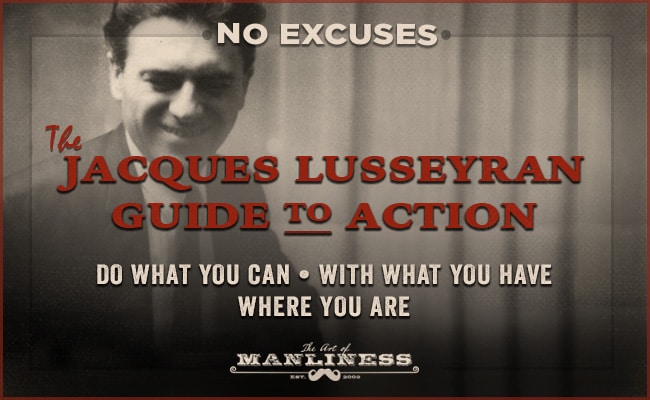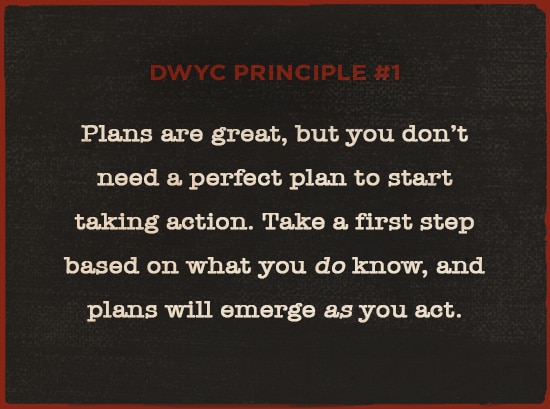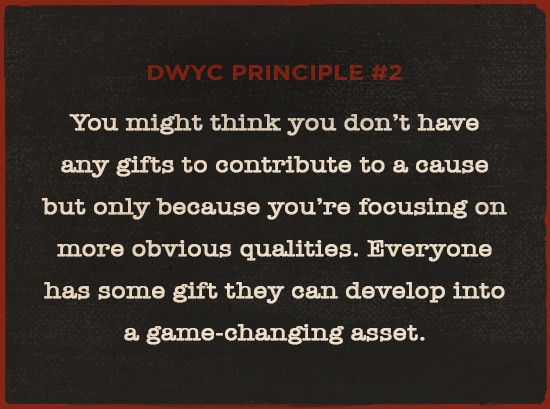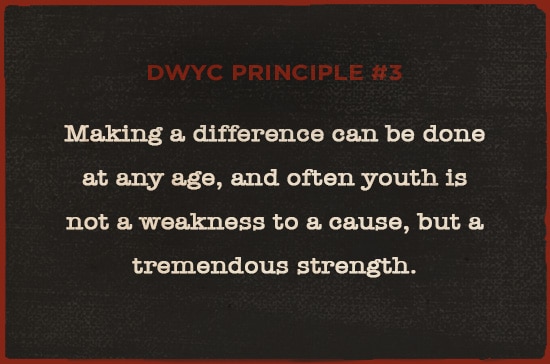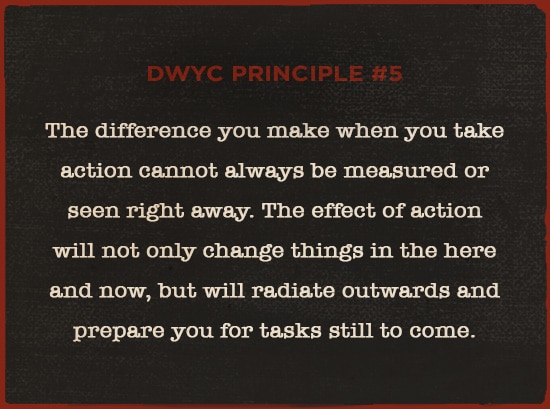A lot of people live in perpetual dissatisfaction with the state of the world.
They feel that virtues like integrity and courage are in short supply, that politics is an embarrassing circus, and that society is getting worse rather than better. And they feel powerless to do anything about it.
They say they’re too young or busy to accomplish anything important, or that they don’t have any gifts or talents to contribute, or that nothing they could do would make a difference anyway.
One man, a boy really, is uniquely suited to squash the ultimately empty excuses we all give for not taking action: Jacques Lusseyran, a little known hero of the French Resistance movement during World War II.
At the age of eight, Lusseyran lost his sight when he fell into the corner of a teacher’s desk at school, and one of the arms of his eyeglasses tore into his right eye. His left eye then suffered from “sympathetic inflammation,†and both were left completely blind.
In a time when the blind were often sidelined from mainstream society and sent to special schools, Jacques never wanted to be an exception or get treated with kid gloves; he went back to his old school, made many friends, rose to the top of the class, and joined with the other boys in their rough and tumble play.
Then in 1941, when he was just sixteen years old, Lusseyran created Volontaires de la Liberté — the Volunteers of Liberty — and recruited 600 of his peers into the French Resistance movement. With the Germans occupying the city of Paris where he lived, and censoring the news coming into France, he and his compatriots began publishing and distributing a bi-weekly underground news bulletin. The Volunteers of Liberty then joined with another, larger Resistance group, Défense de la France (Defense of France). Jacques served on the organization’s Executive Committee and editorial board, and used the little army of young men he had built up to distribute the DF’s own newspaper and grow its circulation to a quarter of a million.
Even when he was eventually arrested and held at the Buchenwald concentration camp, Lusseyran continued to resist the Germans and aid his fellow men — starting yet another covert news organization in order to build morale and encourage the hopes of his fellow prisoners.
Jacques Lusseyran perfectly embodied the maxim of Theodore Roosevelt to “Do what you can, with what you have, where you are.†At every turn, he could have made perfectly sensible excuses for sitting on his hands and doing nothing: “I’m blind! I’m only 16! I live in an occupied country!†Instead, he was always looking for some way to take action.
We have thus created this “Do What You Can†(DWYC) guide inspired by Lusseyran’s life. Below you’ll find 5 of the excuses people commonly give as to why they can’t make a difference, how the example Lusseyran set destroys that excuse, and the DWYC action principle you should replace it with.
Excuse #1: I have an idea but I’m not sure yet how to execute it.
When Charles de Gaulle, leader of the Free French, called upon his countrymen to continue to morally and physically resist the German occupation, Jacques knew “beyond a shadow of a doubt†that he wanted to fight for the “things in our heads and our hearts we called freedom.†Blind in both eyes, Lusseyran knew he couldn’t become a soldier or take up arms, and wasn’t sure exactly when and how he could contribute to the Resistance movement. But he felt sure he’d find a way to do something. As he told a friend: “I am going to make war. I don’t know how, but I shall make it.”
Only the first step seemed clear in his mind: he felt strongly that he needed to meet with his two best friends, and then to connect with ten others. Though he wasn’t even sure what he’d say to them, he felt confident that “when the time came, I should know well enough.†He had no plans, just a purpose, and that was sufficient to get going: “We knew nothing, and yet we already knew everything. We were embarking upon the serious things of life just as a well-hammered nail bites into wood and takes hold.â€
Lusseyran first told his two best friends of his desire to resist the occupation. One was ecstatic; he had been thinking along the very same lines, and humbled Jacques by telling him: “We all expected this from you.†The other had a hundred questions about how exactly their movement was going to organize and operate. And Jacques found, just as he had hoped, that he was able to formulate answers and ideas on the spot.
Jacques then reached out to ten others, giving them just a few details of what he was thinking of doing. They all encouraged him to move on the idea, and he felt a bit of panic at the pressure: “What action was I capable of, blind as I was? Yet it was for me all of them were waiting.â€
So he took another step, calling a preliminary meeting. He expected that just the twelve friends he had contacted would come. Instead, fifty-two of his classmates showed up.
They gathered around Jacques and fell silent. All eyes were on him. At that moment, Lusseyran remembered, “an unaccustomed radiance filled my head, and my heart stopped beating out of rhythm. All at once I began to understand everything I had been seeking and not finding over the past weeks.â€
His words came to him as he spoke. He talked to his new comrades of what it meant to be joining the resistance movement, of the need for absolute secrecy and silence, and how they would start out slow for the next 6 months, building small cells of resistors one at a time.
By simply opening his mouth, the 16-year-old had set the wheels in motion. There was no turning back, even if he still didn’t know exactly how to proceed and what lay ahead. Being an underground movement, “there could be no question of getting expert advice, not from politicians, officers, newspaper men, or even from our parents.†The young men would have to figure it all out on their own.
The next step, and the step after that, and the step after that, emerged as they went along. The movement took shape as Lusseyran acted, and would never have gotten off the ground if he had tried to work out all the details before getting started.
Excuse #2: I don’t have any gifts/talents/abilities that would be useful.
A blind teenager might seem an unlikely leader of a resistance movement, and Lusseyran admitted that most of what he did with the Volunteers of Liberty required the help of his sighted right-hand men. But Lusseyran had developed a set of special abilities that turned out to be absolutely crucial to the operation.
When Jacques lost his sight as a boy, he found that his other senses became keenly sharpened, or as he put it, it wasn’t so much that his senses were heightened, as he simply started “making better use of them.†His sense of smell became animal-like, to the point where he could detect people’s confidence or stress simply by scent. And his sense of touch became so superhumanly sensitive, that as well shall see, it completely altered his view of the created universe.
Sound became a particularly important source of information for him, and he was astonished at how much he had missed before he had lost his sight:
“Even before my accident, I loved sound, but now it seems clear that I didn’t listen to it…
It was as though the sounds of earlier days were only half real, too far away from me, and heard through a fog…my accident had thrown my head against the humming heart of things, and the heart never stopped beating.â€
Lusseyran proactively worked to hone his hearing, joying in the thousand little nuances he learned to discover in what had previously been mere noise:
“I multiplied sounds to my heart’s content. I rang bells. I touched walls with my fingers, explored the resonance of doors, furniture and the trunks of trees. I sang in empty rooms, I threw pebbles far off on the beach just to hear them whistle through the air and then fall. I even made my small companions repeat words to give me plenty of time to walk around them.â€
Jacques could use the sound of creaking floorboards to gauge the dimensions of a room. He could tell where there was a recess in a wall or a crack in a window, and whether a door had been pushed by a human hand or the wind. If a draft moved a stationary object just a tiny fraction, he could hear “its friction in the air, as light a sound as the sound of a waving hand.â€
Lusseyran further learned to read people’s “voices like a book.†He found that if he let the voices inside of him, allowing them to truly vibrate in his head and chest, they would unerringly reveal the character of the person before him. “There was a moral music,†he observed. “Our appetites, our humors, our secret vices, even our best-guarded thoughts were translated into our voices.†Lusseyran discovered that a person’s words and voice could say two different things, and it was always the voice that never deceived.
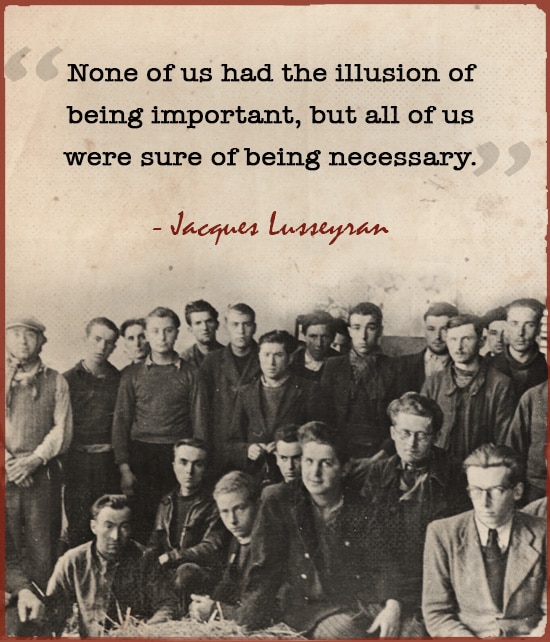
Put all together, while Lusseyran’s blindness was a handicap in one way, it also developed within him a kind of “seeing eye†— a penetrating intuition about people and his environment.
Unsurprisingly then, Jacque’s friends unanimously voted to put him in charge of recruiting for the Volunteers of Liberty. Each new member would have to be vetted before being admitted, and Lusseyran was made the final arbiter of the decision. His friends felt he was the only one for the position, because he had “the sense of human beings†and “would hear more acutely and pay better attention.â€
It was a job that came with the highest of stakes. To let in a mole (and the country was lousy with them) would mean the end of the group, and the imprisonment and likely execution of its members.
Potential recruits were taken to an undisclosed location, and put into a room with Jacques alone. Here he would interview the would-be resistors. Being examined by a blind man invariably caught the recruits off guard. They couldn’t rely on clothes or appearance or facial expressions to win him over. They tried to say exactly the right things, without realizing that he wasn’t listening to their words, but to their voices.
Jacques’ judgments turned out to be nearly unerring. Of the 600 recruits he let into the Volunteers of Liberty, 599 turned out to be loyal to the cause. With one, Lusseyran felt a distinct premonition not to trust him, but was persuaded to change his mind by the man’s other qualifications and the encouragement of his friends.
He turned out to be the informer who eventually got Lusseyran and his comrades arrested by the Nazis.
Excuse #3: I’m Too Young
When Jacques started the Volunteers of Liberty, he was just sixteen years old, and the oldest member of the group was twenty.
Yet as Lusseyran observed, while the group’s youth “did not make all our operations simple,†it “made some of them possible.†In fact, the age of these resistance workers actually proved to be one of their greatest strengths for a couple of reasons.
First, the prejudice against young people not being capable of doing anything significant actually worked in the group’s favor. The boys’ neighbors saw them as just a bunch of kids and were less inclined to suspect they were up to anything. As Jacques explains:
“Young as we were, we could easily go all over, pretend to be playing games, or making foolish talk, wander around whistling with our hands in our pockets outside factories or German convoys, hang about kitchens and on sidewalks, climb over walls. Everything would be on our side…
The Volunteers of Liberty were going to build an information network, not an organization of professional agents but something better, an organization of agents dedicated and nearly invisible because they looked like harmless youngsters.â€
Second, as we’ve previously discussed in-depth, adolescence (which stretches into your twenties) provides the kind of passion and courage that’s typically lacking in grown-ups and is often crucial to overcoming apathy and the fear of risk.
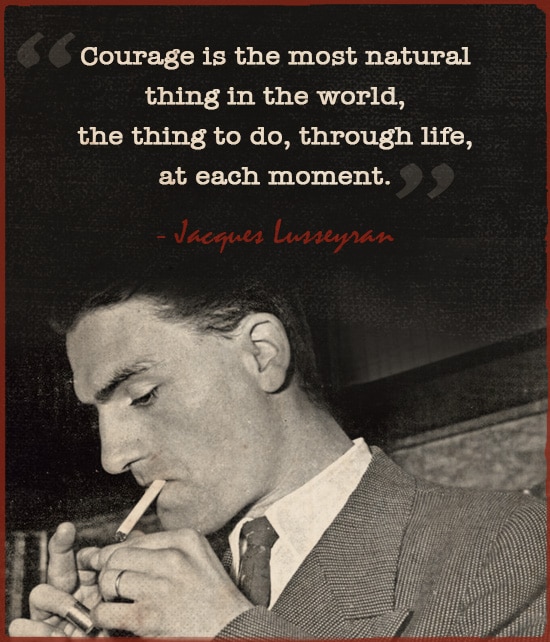 Being part of the resistance was incredibly dangerous and required putting one’s life at stake. Historians estimate that only 2% of the French population became active resistors, and of those willing to participate, Lusseyran observed that four-fifths were less than thirty years old:
Being part of the resistance was incredibly dangerous and required putting one’s life at stake. Historians estimate that only 2% of the French population became active resistors, and of those willing to participate, Lusseyran observed that four-fifths were less than thirty years old:
“The men over thirty round about us were afraid: for their wives and their children — these were real reasons; but also for their possessions, their position, and that is what made us angry; above all for their lives, which they clung to much more than we did to ours. We were less frightened than they were.â€
Lusseyran and his friends burned with an inexhaustible enthusiasm that not only surmounted apathy and fear, but allowed them to even relish their hazards and hardships. “Even in the difficulties of living,†Lusseyran remembered, “we found exhilaration that gave us strength.†For the young Volunteers of Liberty, “there was eternal springâ€:
“none of my friends were hesitating any longer…All of us had plunged into courage. It was our element. We were swimming in it and had no eyes left but for the shore.â€
Excuse #4: I’m too busy.
While acting as a leader of the French resistance movement, Jacques was also a full-time student, first in high school and then at university. He had two passions and goals during this time: to fight the Nazis and to be admitted to the École normale supérieure — an elite institution of higher education which had an extremely competitive selection process.
Lusseyran worked hard to manage both tasks well, even though it meant going absolutely full steam for two years:
“I had made it a point of honor to set up a balance between my two lives, the public and the secret. My days oscillated between studies and action at a frightening pace. In the morning between four o’clock and seven, I walked through books two or three steps at a time. From eight to noon I listened to the teachers, took frenzied notes and tried to absorb knowledge as fast as it was given out. In the afternoon, from two to four, I was still in class. Then at four o’clock the Resistance began.
There were trips across Paris by routes set up in advance for greater safety, meetings, surveys, judgments, discussions, orders to be given, worries, putting the doubting ones back on the road, supervision of founding groups, calls for coolness to those who thought the Resistance was like a detective story, deliberation over the articles for the bulletin, sifting of news, time lost in the kind of summons which could be made neither by letter because of censorship nor by telephone because of lines tapped. By this time it was already eleven o’clock at night, and I believe I only stopped because of the curfew.
Alone in my room at last, I immersed myself in my studies again, and kept on learning until my fingers grew stiff in the pages of Braille. Since my interest in life and my confidence in it were boundless, everything seemed to me as significant the tenth time I encountered it as it had the first. And that gave me an enthusiasm which enabled me to go through fatigue without feeling it.â€
Lusseyran knew that many thought this kind of austere, all-out schedule was nuts, but as he asked rhetorically: “Have you ever known anyone to choose indulgence as a weapon in a fight?â€
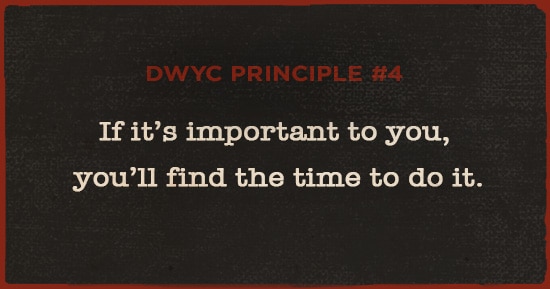
Excuse #5: “Nothing I could do will make a difference.â€
The majority of French people were cowed into passivity not simply from fear, but from the feeling that even if they wanted to take action, there was nothing they could do that would make a difference. Armed resistance or an attempted coup would simply be crushed by the Nazis. And so most simply sat on their hands, “saying nothing and doing nothing while [the] country lay motionless. These folks were known as les attentistes, the waiting ones, and they drove Lusseyran nuts:
“Society for me was divided into two parts, the Hard and the Soft. It was not cowards one found among the soft ones, and certainly not traitors, for traitors were almost always the hard ones who had gone wrong, but the formless race of the procrastinators, all the ones who approved of what we were doing and were careful not to be involved in it. These, of all times, were not times for meaning well.â€
The Volunteers of Liberty and the Defense of France decided that even if they couldn’t attack the Nazis physically, they could still fight them morally. In publishing their underground newspapers, they sought to awaken the conscience of the French people, shake them from their apathy, and keep their hopes alive.
All the news coming into France was heavily censored, and so the papers — slipped under people’s doors and boldly handed out in public — covered what was really happening in the country and in the war. They published stories about who the Gestapo had arrested and killed, the existence of political prisons, and Axis defeats the Nazis tried to keep quiet. The papers printed some of the first photos of the horrors that were happening inside German concentration camps, and the Nazis’ attempt to exterminate the Jewish people.
It was hoped that even the simple fact that a Resistance existed would help strengthen the backbone of the French people — showing them there were still some who had not surrendered to the swastika and the spread of barbarism. France-Soir, the DF’s publication, saw itself not as a political newspaper, but as a Christian one, and thought it was just as important to encourage the survival of the faith’s “absolute demands for respect and love,†as it was to cover the truth about current events.
The paper’s overarching mission was “to keep France from abdicating, to see to it that she was present and intact when she was liberated.â€
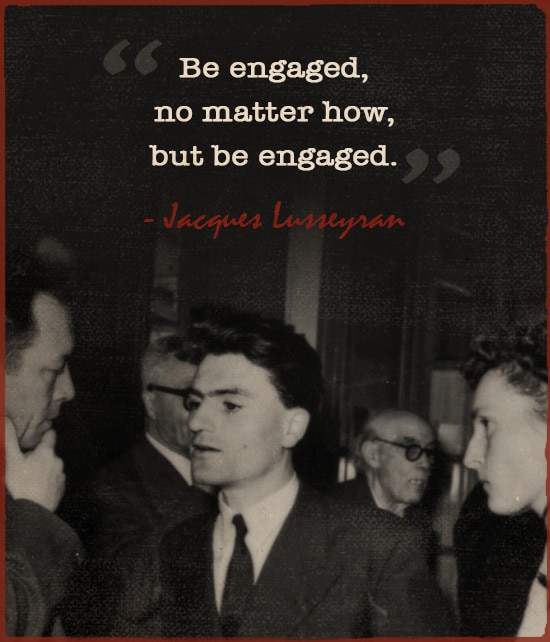
Such an aim is surely nebulous, and it would certainly be easy for critics to say that these newspapers didn’t ultimately make a difference. But the effects of the Volunteers of Liberty and the Defense of France extended beyond their primary work and that moment in time.
The Resistance gave men a purpose; instead of atrophying under occupation rule, their morale was sharpened, their character and skill were tested, and they were prepared for further tasks. When the Allies finally landed in France, the DF had thousands of men ready to fight alongside the troops and assist in the liberation of their country.
The France-Soir, which grew to a circulation of 450,000 by 1944, would become the most important paper in Paris after the war.
And for Jacques’ part, his experience in gathering, appraising, and distributing the news would certainly make a difference to another set of people: his fellow prisoners at the Buchenwald concentration camp, where he ended up after being arrested in 1943.
Lusseyran’s comrades put him in charge of the news at the camp. He was already fluent in his captor’s language, as he had decided to study German two hours every day way back in 1938, simply because he could tell that “Europe was rocking towards the east, toward Berlin, Hamburg, Nuremburg, and Munich,†he wanted to prepare himself to be fully engaged with what was to come.
Jacques used this skill to listen to the bulletins of the German army and the “official†news which was broadcast over the camp’s loudspeakers. He would take down what was said from morning ‘til night and then carefully analyze the information, drawing inferences by omission. For example, when the news began to leave out any mention of Paris, he surmised that it would soon be taken by the Allies. He announced the city’s liberation on August 26 — the day after the last German garrison had in fact surrendered.
Lusseyran would find prisoners who lived in the zone of operations currently at the fore, and make sure he got all the names, places, and distances exactly right. He also gathered a team of interpreters to translate what he had to say into the various languages of the 30,000 or so other prisoners at the camp. Then he would go from block to block, calmly and confidently telling the inmates what was going on outside the walls of Buchenwald. The prisoners in turn would open up to Jacques about their worries and anguish. Yet Lusseyran found that he felt buoyed up, rather than weighed down, by these interactions:
“The remarkable thing was that listening to the fears of others had ended by freeing me almost completely from anxiety. I had become cheerful, and was cheerful almost all the time, without willing it, without even thinking about it. That helped me, naturally, but it also helped the others. They had made such a habit of watching the coming of the little blind Frenchman with his happy face, his reassuring words delivered in a loud voice, and with the news he gave out, that on days there was no news, they had him visit them just the same.â€
In working to help other people hold onto life, Lusseyran found himself better able to hold onto his own. Of the 2,000 Frenchmen with which he was shipped to Buchenwald, only he and two others lived to see their liberation.
Get Started: You Simply Have to Meet the World Halfway
One of the overarching convictions that motivated Jacques Lusseyran to become a Resistance leader despite his age and his blindness, to fight for freedom, and to help others survive Buchenwald, was formed in his youth in the months after he lost his sight.
It was a time in which he was learning to use his other senses on another level. His fingers, which before his blindness “had been stiff, half dead at the ends of my hands, good only for picking up things†developed a new sensitivity. He wanted to touch everything — to measure objects’ dimensions, figuring out their height and weight, making a mental map of their irregularities, and gauging their density.
Forced to know the world tactilely, he made a most surprising discovery: the inanimate world was neither dead nor inert. Even stones, he attests, have a kind of vibration. What’s more, his fingers seemed to have a vibration of their own. And the more he harmonized these respective vibrations, the easier and quicker he could recognize an object. It felt as though when he reached out for things, they simultaneously reached out to him; “everything was an exchange of pressures.†When holding an apple, for example, he couldn’t tell “whether I was touching it or it was touching me.â€
Jacques came to be able to sense these sort of electrical currents even when he wasn’t physically touching the object. He could “feel†objects even at a great distance; “trees and rocks came to me and printed their shape upon me like fingers leaving their impression in wax. The tendency of objects to project themselves beyond their physical limitations produced sensations as definitely as seeing or hearing.†Lusseyran became able to point to where a wall or a hedge or a telephone pole was along a road with an accuracy that absolutely astonished his friends.
The discovery of these vibrations radically altered the way Lusseyran viewed created matter, and transformed the way he approached life:
“Being blind I thought I should have to go out to meet things, but I found that they came to meet me instead. I have never had to go more than halfway, and the universe became the accomplice of all my wishes.â€
If making a difference only involves moving halfway towards our vision of what our families, community, and country might be, what excuse could we possibly have for not taking action?
Do what you can, with what you have, where you are. Watch what happens, and…
Vive la résistance!
____________________
Source:
And There Was Light by Jacques Lusseyran


